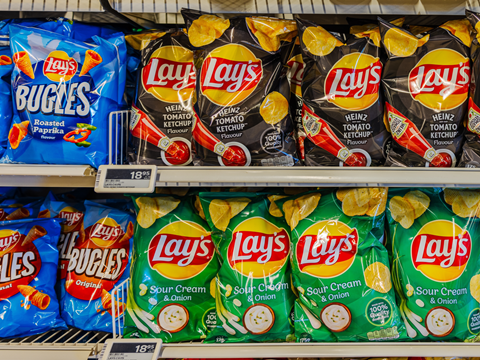
In its 2023 ESG Summary Overview, PepsiCo estimates that it will fall 2% short of its target to design 100% of its packaging for recyclability, compostability, biodegradability, or reusability by 2025 – attributing its doubts to “a unique set of challenges”.
Compared to a 2020 baseline, PepsiCo claims to have cut virgin plastic from non-renewable sources by 1% per serving across its global beverages and convenient foods portfolio. Its absolute tonnage of virgin plastic derived from non-renewable resources was said to have increased from -11% in 2022 to -6% in 2023.
In line with its goal to implement 50% recycled content into its plastic packaging by 2030, the company is thought to have utilized 10% across its portfolio last year. More than 30 markets sold at least one PepsiCo product packaged in 100% rPET (excluding caps and labels), the report states.
PepsiCo claims to have sold 10% of its beverage servings in reusable models, including its SodaStream platform, fountain beverages delivered in reusable containers, returnable glass and plastic bottles, and concentrates and powders sold to consumers. This keeps the company on track to reach its 20% target for reuse servings by 2030.
It is also thought to have become the first beverage company to announce a North American roll-out of a paper-based replacement for plastic rings on all beverage multipacks in 2023.
In another sustainability target, PepsiCo aspires to design 100% of its packaging to be recyclable, compostable, biodegradable, or reusable (RCBR) by 2025. As of 2023, the percentage had reached 89% - and, at the current rate, PepsiCo believes that its target will not be reached in two years’ time.
“While achieving our packaging goals comes with a unique set of challenges to overcome, we continued to work toward our ambitions in 2023,” the report says. “Given those challenges, we currently project that, by 2025, we will have designed 98% of our packaging to be RCBR and that 92% of our packaging will be overall RCBR—that is, both designed to be RCBR and RCBR based on availability of end of life solutions.
“This current projection has us short of our 100% goal, but, we continue with our ambition to innovate, invest and partner to progress further.”
The news comes after Unilever scaled back its original target of halving virgin plastic consumption by 2025; instead, it now plans to reduce consumption by a third by 2026. Critics accused the corporation of prioritizing financial performance over sustainable progress, with fears arising that 100,000 tons of fresh plastic could now be produced annually. However, others felt that the decision was a realistic one.
In response, we caught up with Pablo Costa, Unilever’s Global head of Packaging. He told us that the company is “doubling down rather than watering down” its efforts to cut down on plastic pollution, and is “more determined than ever” to find alternative solutions.
Similarly, Colgate-Palmolive believes that “industry-wide challenges” regarding flexible packaging will mean it will miss its targets to achieve recyclability, reusability, and compostability across its packaging range by 2025. Chairman, president and CEO Noel Wallace stated that, “while we have set clear targets in areas such as using less plastic and more recycled plastic and making all of our packaging recyclable, reusable, or compostable, we also need to work with others towards systemic changes that no company can achieve alone.”
If you liked this story, you might also enjoy:
How are the top brands progressing on packaging sustainability?
The ultimate guide to global plastic sustainability regulation














No comments yet